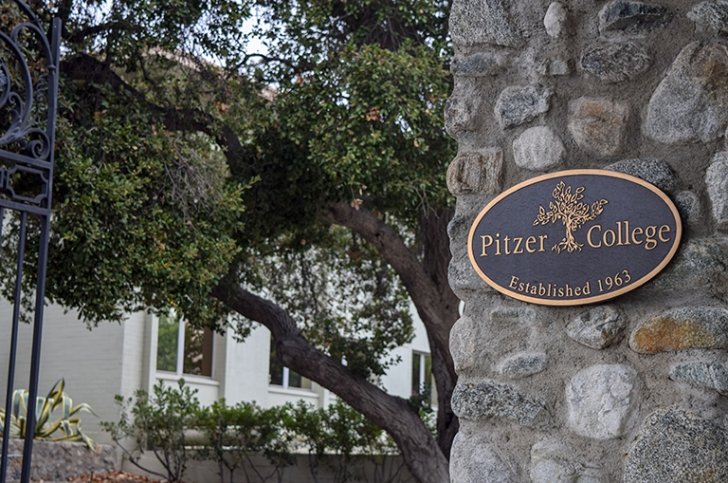High Levels of Voter Participation Among Pitzer College Students Earns National Recognition

Claremont, Calif. (November 11, 2021)—A new report from the Institute for Democracy & Higher Education (IDHE) shows a dramatic increase in the number of eligible Pitzer College students who voted in the 2020 presidential election compared to the 2016 election. Pitzer students’ voting rate rose to 79.7 percent in 2020 from 56.9 percent in 2016, according to IDHE’s National Study of Learning, Voting, and Engagement.
The students’ high voter turnout earned Pitzer a platinum seal award from the ALL IN Campus Democracy Challenge, a national, nonpartisan initiative of the nonprofit Civic Nation. Pitzer was one of only 47 campuses to earn platinum honors, which were awarded to colleges and universities that reached 80 percent or above student voter rates. More than 840 institutions enrolling close to nine million students participated in the ALL IN Challenge. ALL IN awards were announced on November 8 in a virtual ceremony featuring Secretary of Education Miguel Cardona as the keynote speaker.
During the ceremony, Civic Nation CEO Kyle Lierman said the ALL IN Campus Democracy Challenge initiative aims to help create a more inclusive democracy and strengthen college and university efforts to improve civic learning, political engagement, and voter participation.
“The individuals and campuses being honored today are leading the way,” Lierman said.
Pitzer’s voting rate came in well above the national average—66 percent—of all higher education institutions that participated in IDHE’s study. Nationwide, students voted at relatively high rates in the 2020 election, with turnout increasing to 66 percent from 52 percent in the 2016 election, the study says.
“We attribute this high level of participation to many factors, including student activism on issues such as racial injustice, global climate change, and voter suppression, as well as increased efforts by educators to reach students and connect them to the issues and to voting resources,” said IDHE Director Nancy Thomas.
Tricia Morgan, the managing director of Pitzer’s Community Engagement Center (CEC), also credits powerful get-out-the-vote efforts nationwide—”particularly the work of women of color organizers like Stacey Abrams, LaTosha Brown, DeJuana L. Thompson, with the help of great organizations such as Fair Fight, Black Voters Matter, Vota Jota, and so many more,” she said.
She also cited CEC’s The People’s Pitzer civic engagement initiative, which launched in September 2020 and provided an array of resources to help prepare and motivate Pitzer student voters.
“In only two months’ time, we were able to accomplish a lot,” Morgan said.
Operating in a virtual realm due to the pandemic, The People’s Pitzer (TPP) created a multi-pronged voter engagement plan that included voter registration drives, “proposition parties” focused on in-depth analysis of state-wide propositions, and Get-Out-the-Vote efforts. Among its many other programs and activities, TPP held debate screenings, invited community partners to discuss the impact of proposed legislation on the communities they serve, and worked with faculty interested in incorporating aspects of civic engagement in their courses.
Civic engagement became one of the CEC’s five pillars of engagement in 2020 and is an integral part of CEC’s work, Morgan said, who noted that TPP will draw on the new IDHE report’s data to create targeted student voter outreach plans.
“We understand civic engagement as a key component to advancing legislative policy and social change within our communities,” Morgan said. “We know that voting or developing policies will not solve all of our problems, and yet, these are powerful tools at our disposal.”
Encouraging Pitzer students to use those powerful tools has a long history at Pitzer. Years ago, the late Agnes Moreland Jackson, professor emerita of English and Black Studies, and Judith Grabiner, Flora Sanborn Pitzer Professor Emerita of Mathematics, combined forces to get out the vote at Pitzer by posting flyers, sending letters to students, organizing forums, and making voter registration forms available on campus. After Jackson retired, Grabiner pledged to continue the tradition, which she has carried on—now via email—even after her own retirement in 2016.
“And as long as there are attempts to make it harder for some people to vote, I want to help make it easier for them to do so,” Grabiner said.
IDHE’s National Study of Learning, Voting, and Engagement is the nation’s largest study of college and university student voting. Nearly 1,200 campuses participate. IDHE is located at Tufts University’s Tisch College of Civic Life.
News Information
Published


